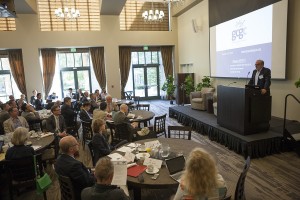Stanford Law School Hosts First-Ever Global Corporate Governance Colloquium

How does a country’s left-right political orientation shape its financial markets? Have activist efforts by hedge funds improved corporate performance? Does requiring boards of directors to have a minimum number of women affect stock prices?
These were a few of the questions discussed at Stanford Law School (SLS) June 5 and 6 by 60 of top corporate governance scholars from around the globe. The unique conference, the first of its kind, included an interdisciplinary mix of business and law professors drawn from as far as the University of New South Wales in Australia and the Stockholm School of Economics, as well as U.S. universities including Harvard, Stanford, Columbia and Yale.
Idea brought to fruition
Ronald Gilson, Charles J. Meyers Professor of Law and Business at SLS, chaired the conference, a new annual project called the Global Corporate Governance Colloquium. The idea was dreamed up by Gilson along with Colin Mayer, dean of Oxford’s Said Business School, and Gerard Hertig of the Zurich Institute of Technology (ETH) in a conversation one afternoon in Oxford three years ago. Academics too often stay in their own silos, and international and interdisciplinary collaboration remains particularly rare in the corporate governance arena, even as corporations act in a global economy.
“The idea was, let’s create the single best global corporate governance conference,” said Gilson. “It’s more clear to everyone that the relevant academic community in this area is global, capital markets are global, but there isn’t an event that pulls together those people who are doing the best work across geographies and disciplines.”
Twelve leading schools are involved in the project – four each from the U.S., Europe and Asia. Stanford Law School was invited to host the first event, and future meetings will rotate among the continents and participating schools.
“We were honored to host this first-of-its-kind conference. Corporations and their lawyers operate in an increasingly global playing field, and this conference provided an international group of the top scholars a chance to break through geographic and disciplinary barriers,” said M. Elizabeth Magill, dean and the Richard E. Lang Professor of Law at SLS.
During the opening session, Gilson noted the appropriateness of hosting the inaugural event in Silicon Valley. “The Global Corporate Governance Colloquium was really an exercise in entrepreneurship in the pure Silicon Valley sense,” he said. “The [project] began with that magic phrase,‘what if.’ Now we’re about three years in, and today is our product launch.”
Five Stanford participants
The program included papers invited from well-known law and economics scholars and others chosen through a juried call for papers. Michael Klausner, the Nancy and Charles Munger Professor Business and Law at SLS, spoke at a lunchtime panel on empirical finance. Three professors from the Stanford Graduate School of Business also took part in the conference.
Klausner’s talk, titled “Take a Lawyer to Lunch (Please),” referenced an academic joke: If law professors want to do economically sophisticated work, they need an economist as a coauthor, but if an economist wants to do legally sophisticated work, they need only take a law professor to lunch.
In reality, Klausner argued, economists and finance scholars – many of whom were represented in the room – often get important legal dimensions wrong in their work. In particular, he critiqued indexes that have attempted to quantitatively rate governance quality. The truth is, he said, the data includes corporate behaviors that have no relationship to the problem of bad governance, which means that empirical studies that rely on those indexes to study the relationship between good governance and good performance are problematic.
Gilson reported that the participants were delighted with the inaugural event. “Sixty academics are rarely unanimous about anything, let alone the quality of a conference, but they were about their two days at Stanford Law School,” he said. The conference will reconvene in 2016 at the Stockholm School of Economics and in 2017 at the University of Tokyo.
Jacob Hale Russell is a lecturer in law and teaching fellow for Stanford Law School’s LLM Program in Corporate Governance and Practice.
